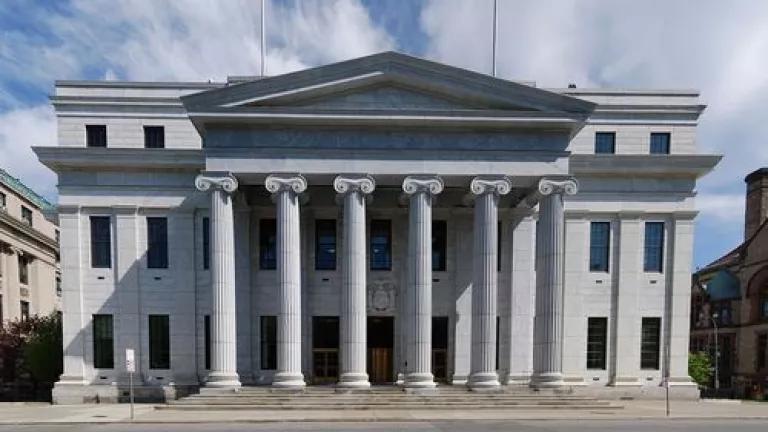
Yesterday, the New York Court of Appeals, the state’s highest court, heard arguments in the two most important home rule cases in the state—Norse Energy v. Town of Dryden and Cooperstown Holstein Corporation v. Town of Middlefield—in which NRDC submitted amicus or “friend of the court” briefs last month on behalf of environmental and non-profit organizations.
At issue in these cases is whether municipalities will be able to exercise their traditional land use authority over oil and gas activities—including if and where fracking will occur—or whether, as industry argues, state law has deprived local residents of all say in the matter, leaving towns powerless to prevent wells or processing facilities from being sited next to a school, a hospital, or in the middle of a local neighborhood.
The Court of Appeals courthouse. Photo by UpstateNYer.
Given the stakes, it’s not surprising that the court house was packed to capacity, with many spectators directed to overflow rooms to watch the arguments on closed circuit TV. Although by this point in the appeals process much has been said about the legal issues in these cases (some of my own earlier discussion of these issues can be found here and here), that didn’t stop the judges from asking some very tough and pointed questions of both sides (known in the business as a “hot bench”).
As any good lawyer will tell you, it’s almost impossible to tell how a judge will rule based upon the questions they ask in court, but some themes were evident in the Court’s questioning. The judges seemed to be particularly concerned with the consequences of their decision either way. Would upholding local zoning authority conflict with state energy policy, as the industry attorneys asserted? And what if, conversely, the Court ruled in favor of industry? Would local communities have any powers left when it comes to protecting themselves against industrial fracking?
As to the first question, attorney for the Town of Dryden, Deborah Goldberg of Earthjustice, compellingly pointed out that many of our oil and gas producing states—such as Oklahoma, Illinois, California, and Texas—have strong home rule controls. In Texas, for example, the nation’s top gas producing state, municipalities have long enjoyed broad authority to ban oil and gas drilling and can even regulate highly technical aspects of the extraction process. Put otherwise, there’s no evidence anywhere that small town zoning boards are a threat to oil and gas drilling generally, even if some democratically decide to ban the practice. (Of course, we are working hard to achieve a 100% clean, sustainable energy future for New York, and remain committed to maintaining the state’s de facto moratorium on fracking so that the true health impacts of fracking can be fully studied.)
On the other hand, oil and gas drilling can have real adverse impacts on local towns (for more detailed information on these potential harms, see our amicus brief). When asked if they thought the New York oil and gas law left any room for local control that even incidentally affected oil and gas extraction, the response from the industry attorneys was clear—“no.” In other words, it’s industry’s position that if an operator wanted to drill a frack well next to a public playground or conduct noisy drilling and fracking activities at night in a residential neighborhood, local residents would have no say in the matter at all.
To be fair, were it not the case that every court in New York that has addressed this issue has ruled in favor of upholding municipal authority, there may be some ambiguity as to whether the language of the state oil and gas law preempts local zoning authority when it comes to oil and gas activities. But therein lies the rub.
If the law is ambiguous, the consequences of the judges' decision should matter more. And because the consequences of industry’s interpretation of the law are so great—potentially harming the health, property, and welfare of millions of New Yorkers as well as the state’s natural and historic resources—there’s just no reason to resolve that ambiguity against established legal precedent and the holdings of all the lower courts.
That being said, it’s still anyone’s guess as to what or when the Court will rule on the issue. Although some sources have noted that a decision is expected in early July, if a decision doesn’t come down by that time, it’s likely we won’t see a ruling until the fall, after the Court’s summer recess. Until then, we’ll keep posting any relevant updates, and crossing our fingers for a speedy and definitive decision in favor of Dryden, Middlefield, and all New York towns that want to stand up to fracking.

